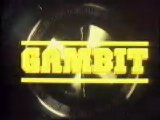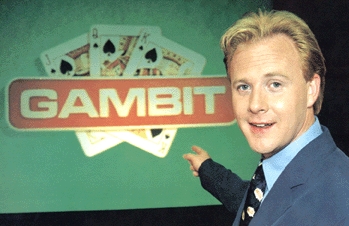Gambit
Contents |
Host
Dickie Davies (non-broadcast pilot)
Fred Dinenage (1975-83)
Tom O'Connor (1984-85)
Gary Thompson (1995)
Co-hosts
Hostesses:
Eva Rueber-Staier (non-broadcast pilot)
Ann Dunsford (1975)
Michelle Lambourne (1976-85)
Joanna Park (1995)
Voiceover: John Benson
Broadcast
Anglia for ITV, 3 July 1975 to 28 May 1985
Anglia (regional), 23 July to 5 November 1995 (13 episodes in 1 series)
Synopsis
Pontoon on the telly, yeah? Two heterosexual couples buzz in to answer questions. If they get one right, they can choose to take the next playing card from a pack or force it onto the other couple. The object is for the cards to add up to as near as 21 as possible, without going over. The winners of the game are the first couple to either score exactly 21 (which gets them a bonus prize) or see their opponents go bust. This is then repeated until one couple has won two games.
At this point they go onto the Gambit Board, a bit of plywood with 21 squares. The couple pick squares, each with a prize behind them, and get a card to go with them. They can carry on doing so for however long they want, but if the cards add up to over 21 they lose all the prizes. If they get exactly 21, they also get the star prize. Then the whole thing starts again in the second half of the show with the winners playing another couple, and so on.
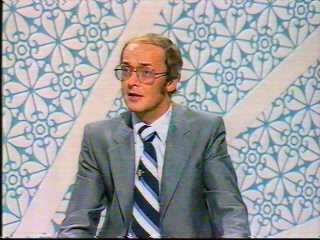 Host, Fred Dinenage.
Host, Fred Dinenage.Like its Anglia stablemate, Sale of the Century, Gambit offered some impressive prizes given its obviously tiny budget. There was twenty quid for winning a game, plus a bonus prize for landing exactly 21 which started at £200 and went up by fifty quid every time it wasn't won until a limit of £500. The twenty normal squares on the Gambit Board each housed a prize, from a weekend break to a microwave oven to a canteen of cutlery to, er, a set of darts, and behind square 21 was the choice of star prize, normally between a fortnight abroad and a Mini on a disco turntable. If you were lucky, you could actually go away with armfuls of stuff, of varying quality; if you were unlucky you could leave with bugger all.
Gambit was "the quiz and card game for married couples", as Fred snappily put it, and your usual mix of pensioners and newlyweds found themselves behind the desk. All they had to do was be able to put up with Fred's insults, which he would hurl, Richard Madeley-like, in everyone's direction whether he intended to or not ("From one Fred to another, do you like being a Fred?" "Well, y'know, it's not all that, The Goons..." "Yeah, absolutely... stop talking, Fred"). According to Fred in the TV Times in 1982, of which we'll hear more later, the luckiest contestants were pensioners and taxi drivers, while the unluckiest were the Scottish. What sort of luck a retired Scottish taxi driver would have, we don't know.
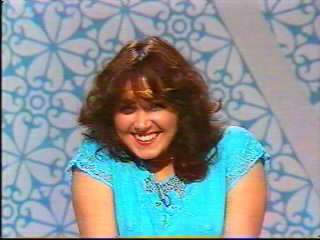 Gambit's most famous hostess, Michelle Lambourne.
Gambit's most famous hostess, Michelle Lambourne.Gambit had some decent prizes, a pretty sturdy format, a cracking theme and a relaxing air to enjoy with your tinned peaches and evaporated milk. There was also Peter Fenn on the organ, this time in vision, smiling at the camera while performing a musical clue for a question, and John Benson's dulcet tones provided the voice-overs. But the show has been remembered for one reason only - Fred. His performance on the show really was a tour de force. He would always be firm with his contestants - on any other show, if a contestant was chatting during one of the links, the host would just ignore it, but not Fred, who would break off to ask "You got a problem there, Frank?".
That's not to say he could be entirely cold-hearted; on hearing a contestant liked singing, he asked "Would you like to give us a little trill?" and, after a few bars, gave the verdict, "Fine, don't call us! No, er, but seriously, that was lovely, really delightful actually". Fred also took the art of quizzing seriously, and after nobody was able to tell him what animal a member of the lupine family was, asked dippy sidekick Michelle Lambourne ('the thinking man's muppet', as he so charmingly described her) what she thought. Her response - "Don't be silly, lupins are what grow in my parents' front garden!" - was met with a look of absolute disgust and fury from a pissed-off Fred. And rightly so, as Gambit was, in fact, an "Olympics of the mind".
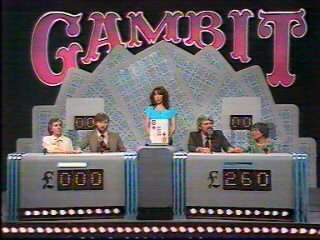 The Gambit set, the back of which is made out of giant-sized playing cards.
The Gambit set, the back of which is made out of giant-sized playing cards.Or at least, that's what Fred said in an interview where he also provided his top tips on how to do well on the show; "You've got to prepare yourself both mentally and physically. Have plenty of early nights before the contest and don't drink. A spot of jogging won't do the old grey matter any harm, either, if your doctor approves. Spend an hour or so every day with a good encyclopedia and read lots of newspapers." Hence, while other quizzes were entirely populated by hungover lardarses who didn't know anything, on Gambit everyone who took part was a lean, mean quiz machine.
Fred also had tips for a harmonious married life at the same time, claiming "One or two of the couples have had a blazing row after the show because the husband got it wrong. I suppose it's understandable when a lot of money can hang on one answer. It pays to check with the wife before answering." If only everyone would listen to Fred's advice, there may be peace throughout the world. The other great thing about Fred was that he was billed as "compere" in the credits.
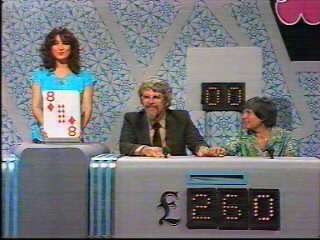 The couples are competing for an "8".
The couples are competing for an "8".Sadly, Fred decided that Gambit was too small a platform for him to launch his intended world domination, and so he left the programme in the early eighties, and was replaced by Tom O'Connor, who inevitably was just your standard game show host and had none of Fred's little quirks.
Fred had a sign on the desk in front of him displaying the current prize for hitting the target, a la "21 PAYS £200". We'd like to question whether they had to print up dozens of them to stick on the desk every time the total went up, which seems rather too much in the way of effort. That said, the Anglia art department did come up trumps with the Gambit Board, each square swivelling round to reveal "Holiday For 2" in bubbly font, or "Microwave Oven" in an 'electronic' font, which was that little touch of class. While we're discussing the show's look, kudos also to the show's set, meant to resemble a massive set of playing cards, but only obvious in a wide shot, otherwise it just looked like some particularly repulsive flock wallpaper.
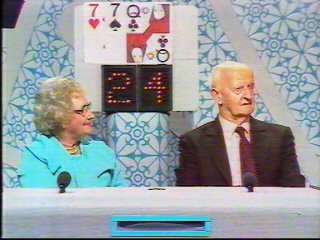 24 is too many, they've gone bust.
24 is too many, they've gone bust.Transmission details for Gambit are actually pretty hard to come by, as it never really made it into the A-list of quizzes. We're not sure if it started as a regional show, but it was certainly in most regions by the start of the eighties. The normal slot would be 5.15pm, normally on a Monday evening, though the various regions would tend to shift it about all over the place. Only Anglia, inevitably, gave it the respect it deserved and a peaktime slot, normally shifting something like Winner Takes All to teatime so Fred could go on at seven o'clock. We think Tom O'Connor took over in about 1983, but the rise of stripped shows like Blockbusters and Connections (1) in the teatime slot left a sedate once-a-week show like Gambit look a little out of place, and it was quietly dropped. However, there was a revival in 1995, with Anglia bringing it back on Sunday afternoons for regional viewers only, fronted by some bloke called Gary T Thompson. It was also rumoured that Anglia might make Gambit their contribution to the launch schedules of Channel Five, but sadly this never happened. It would have been better than Jools Holland's Name That Tune, at least.
Summing up, Gambit was an unassuming quiz was taken to the heights by Fred's superlative performance as presen... sorry, compere, and made it one of the most incredible programmes Creamguide has ever seen. It's a decent format, actually, though whether it would survive in the 21st Century is another question. And we wouldn't really want to see it without Fred, either, and he'd have a job fitting it in between Meridian reportage and Portsmouth board meetings. Some repeats would be nice, though, to show a younger generation just how a quiz should be done.
Key moments
There was always an elaborate cutting a ribbon and cutting the deck ceremony each time a new pack of cards was used.
Top blunder ahoy:
Fred: Which vegetable helps you to see in the dark?
Contestant: A banana.
(He was looking for the answer "carrot", which is a myth anyway. Unless it's one of those genetically-engineered glow-in-the-dark carrots.)
Catchphrases
"The quiz and card game for married couples"
"Would you like to cut the cards?"
"Stop talking!"
"You got a problem there?"
...and Fred's trademark furious look whenever Michelle tried to be funny and upstage him.
Inventor
Based on the US show of the same name, created by Merrill Heatter and Bob Quigley.
Theme Music
The original opening theme tune is called 'Hearts Are Trumps', composed by the show's organist, Peter Fenn.
Opening titles
Trivia
The show suffered for much of its life by being transmitted on different days of the week in different ITV regions - and also from the fact that the time taken to play a match could vary considerably and therefore the show almost always ended mid-way through a game.
David Self, having been brought in to set the questions for Anglia's Sale of the Century, also took on the job of setting them for Gambit in 1981.
What ever happened to Michelle Lambourne? Well, on the website haemorrhage that is Myspace, one user called Geoff claims to have sold some cheese to her. So, assuming that's not some euphemism we're unaware of, she's still around somewhere. She also seems to have been "Phil's mother" in a 1995 movie called Boston Kickout, although it's hardly a Hollywood career as yet because she's found with a rope around her neck in the first five minutes. However, we are pleased to report that according to reader "Deke", as of 2010 "she's alive and well, married with a 19 year old son and living in Essex, England, UK. She's house proud, enjoys gardening and sculpting 'grotesque' type faces from modelling clay... very good at it too (not spotted Fred Dinenage yet though!)" And Sam Scholfield tells us that Michelle is "married to Phil Scholfield and their son (Sam) to be 21 on the 2nd of January 2011. Michelle's acting career also was seen on other adverts including a Johnsons baby oil advert around 1990/1991."

